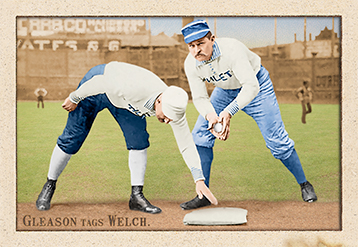
- Series: 1880s: Diamond Duos
- City: Philadelphia
- Team: Athletics (AA)
- League: American Association
Bill Gleason:
William G. Gleason (1858-1932) was an American Association shortstop for three teams from 1882-89. During those eight seasons Gleason hit .267. He debuted with his hometown St. Louis Brown Stockings and participated in their three pennants in '85, '86 and '87. He was an everyday player and increased the number of games played every year with the club, culminating in '87 when he appeared in 135 games with a fine .288 average. St. Louis management must have anticipated a decline was in store. He was traded to Philadelphia's Athletics in '88, where his hitting fell off to .224. Philly dealt him to the Louisville Colonels for his final campaign. Gleason saw action in only 16 games in 1889. He stayed in pro ball for two more minor league seasons with Washington of the Atlantic Association in 1890 and finished up with the Rockford Hustlers of the Illinois-Iowa League the following year where he recorded by far the highest average on a squad that included eight other past or future big leaguers.
- In a storied and rowdy “championship” contest following the 1885 season, Gleason's Browns vied with the formidable White Stockings. Bill was at the center of the storm as his throw to first was ruled late, infuriating the home folks and precipitating a long row in which Cap Anson refused to allow the Chicago umpire to be replaced. Comiskey called his team off the field which led to a forfeit of the first game. The “Series” ended in a tie.
Curt Welch:
Curtis Benton Welch (1862-1896). Primarily a center fielder for 10 professional seasons, Welch was a fast runner with great instincts. His “$15,000 slide” into home clinched the 1886 World Series for the St. Louis Browns. It has been called the most famous play of the 19th century.
- Top 10 in steals 6 years in a row
- Currently ranks 51st all-time in steals (453)
- Alleged to have hidden beer behind billboards so he could drink during games
Auction History
Cartophilia
Old Judge Pose: 485-7
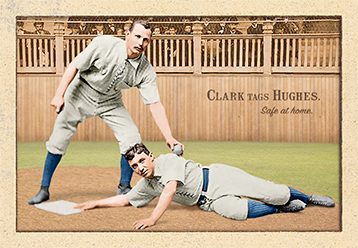
- Series: 1880s: Diamond Duos
- City: Brooklyn
- Team: Bridegrooms
- League: American Association
Bob Clark:
Robert H. Clark (1863-1919) cut his teeth in the fierce baseball rivalries between his native Covington KY and neighboring Cincinnati. He was enjoying a fine rookie season with Atlanta but caught the attention of the scouts when he was dragooned into catching after an injury to the starter. Bob came up with Brooklyn in 1886 and found great success there, handling all the staff. Bob was praised by the NY Clipper in ‘88 as one of the Bridegrooms’ most valuable players. During his five seasons in NY Clark hit a fine .241, but saw his average plunge after leaving Brooklyn in ‘91 for part time duty with Cincinnati and Louisville for one year with each club. Undoubtedly, Clark’s career highlights were the two Brooklyn pennants, first in ‘89 in the American Association and the following year when the franchise joined the National League.
- Clark died tragically from a fire back home in Covington at age 56
Mickey Hughes:
Michael J. Hughes (1866-1931) got 25 of his three-year career total 39 wins for the Brooklyn Bridegrooms in his rookie season, 1888. That performance earned Hughes the opening day start for Brooklyn in 1889, but he fell to a lackluster 9-8 record that year. Hughes was traded to the Athletics in 1890, finishing his brief ML tenure going 1-3 in six games.
- In Brooklyn’s final year in the American Association, Hughes went 1-0 in the 1889 Series against the NY Giants, won by NY 6 games to 3
Auction History
Cartophilia
Old Judge Pose: 76-6
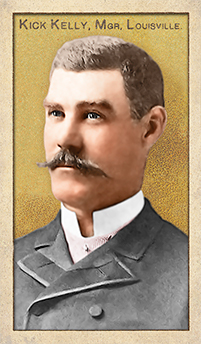
- Series: Beginnings: 1880's
- City: Louisville
- Team: Colonels
- League: American Association
John O. Kelly (1856-1926) was known variously as Kick, Honest John and Diamond John. He was a catcher for the Syracuse Stars and Troy Trojans in 1879 before turning to his real calling of refereeing, first in baseball and later in the boxing ring. As an operator of gambling houses in his native New York City, John “officiated” at another kind of gaming later in life.
Kick’s record at bat was a perfect motive to change uniforms. He averaged .155 in his 16 games in the early major leagues. By 1882 Kelly was umpiring in the National League and moved to the American Association the following season. Men in blue fared poorly in the diamond’s dawn. They were vilified and, too often, pelted by players and fans alike. Working alone gave ample opportunity for wily runners to cheat. Kelly lasted longer than most of his era. He and another “Honest John” (Gaffney) presided over the 1887 post-season match between the NL’s Wolverines and AA’s Browns. They pioneered a two-ump system that would transform the game.
- Kelly turned briefly to managing with the Louisville Colonels in 1887 and had a successful 76-60 season. His club flagged the following year and Kick was canned
- Refereeing Jim Corbett’s match in 1894 nearly cost Kelly his life. Baseball wasn’t the only hazardous profession for officials. Well-armed fans intimidated Kelly into a no-call
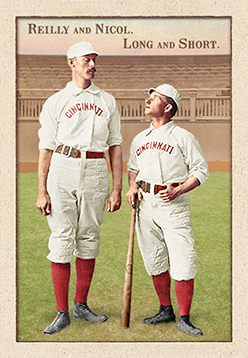
- Series: 1880s: Diamond Duos
- City: Cincinnati
- Team: Red Stockings (AA)
- League: American Association
John Reilly:
John Good Reilly (1858-1937) was a one-man Big Red Machine long before the days of Bench, Morgan and Rose. When he was replaced at first base by Charles Comiskey in 1892, Long John held the Cincinnati record in singles, doubles, triples, home runs, runs scored, RBI, and games played. His decade with the Reds had seen Reilly consistently rank in the league top ten in most offensive categories. In addition, his lean 6’3” frame made him a welcome target for his teammates. To this day, after more than a century of powerhouses in the Queen City, Reilly remains one of only four in team history to twice lead the league in HRs. In 2012 he was inducted into the Cincinnati Reds Hall of Fame, which according to the team’s website is the oldest continually operating team Hall of Fame.
- Reilly had been orphaned at age three when his father died in the Battle of Fort Donelson while serving as captain of a Union ironclad gunboat
- Long John grew up in Cincinnati as a professional artist until lured by his love of baseball. He was loyal to his hometown, retiring rather than moving to another club
- Career home runs were impressive for the era at 69
Hugh Nicol:
Hugh N. Nicol (1858-1921) was one of the great “little men” in all of baseball. This Scottish immigrant arrived in Rockford, IL in 1865 and grew up playing a mid-west style of ball that would suit him for great accomplishments in the major leagues. After only two years with his hometown White Stockings, the Chicago version called him up to Cap Anson's powerhouse in 1881. He was only a part-timer for the champion club in his first two seasons before his speed caught the attention of Chris Von der Ahe and Hugh moved to the Browns. “Little Nic” became a favorite with his outfield speed and accurate arm. Measuring speed on the bases is particularly challenging in evaluating 19th century players as “stolen bases” didn't factor into record-keeping for a long time and rules changed into the '90s. Nevertheless, Nicol's 138 steals credited in 1887 surely rank him among the greats. SABR's Charles Faber notes that this accomplishment came at age 29, leaving it to the imagination how many this speedster swiped in his early years. Hugh set this all-time record for his new club, the Reds, after being part of MLB's first trade. Von der Ahe sent Nicol to Cincinnati for Jack Doyle and $400 after the '86 campaign. His fame preceded Hugh to the Queen City, as reported by The Sporting News: “Hugh Nicol's addition to the Cincinnati team means chain-lightening on the bases. He is worth all the young blood in Christendom.” The diminutive (5'4” 145lbs) utility man never hit very well, although he did shine in his first season in St Louis with a .285 average. His ten-year ML tenure saw him hit .235 for three clubs before returning to the minors and a managerial career that lasted through the 1905 season with various Illinois teams.
- The light-hitting Nicol had a highlight game for the Browns in late 1883 as the club was seeking to overtake the Phils. Hugh went five-for-five with a walk and scored five times. The Browns fell one game short of Philadelphia for the pennant
Auction History
Cartophilia
Old Judge Pose: 346-7
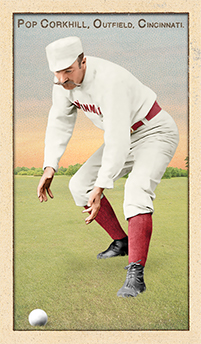
- Series: Beginnings: 1880's
- City: Cincinnati
- Team: Red Stockings (AA)
- League: American Association
John Stewart Corkhill (1858-1921) was an excellent fielder who found steady work in the outfields of the Red Stockings and Bridegrooms from 1883-90. Pop was still in demand and played out his career in Philadelphia and Pittsburgh before a beanball served up by Ed Crane prompted the veteran to hang ‘em up in 1892. Corkhill led the league in fielding several times, twice with his first club in Cincinnati and twice in Brooklyn where he played for pennant-winners in ‘89 (NL) and ‘90 (AA). A clutch hitter, Pop drove in 97/97/93 during a fine stretch from 1886-88. Proving his versatility, Corkhill made relief appearances in five seasons. He recorded two saves in an era not known for bullpen assistance.
- Corkhill was acquired by Brooklyn late in the ‘88 season along with the notoriously voluble Oyster Burns as owner Charles Byrne assembled a powerful squad
- Pop’s NY Times obituary noted that he had established a record with Cincinnati, playing three consecutive years without dropping a fly ball
- Corkhill passed away at home following surgery. It is unknown whether this was related to his career-ending injury




